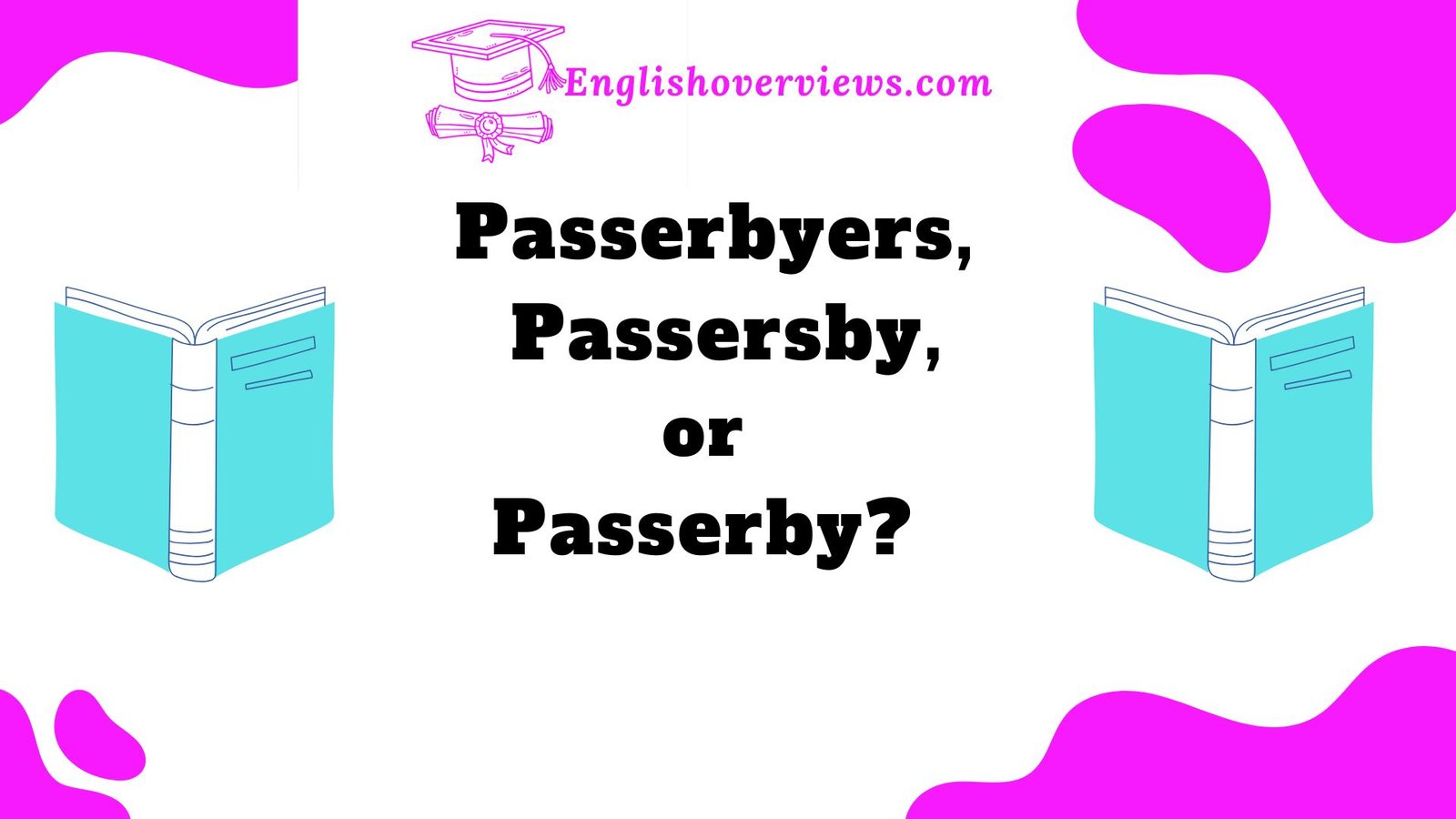Language is constantly evolving, and words we use every day often carry more complexity than we realize. Take the term “passerby.” It’s one of those words that causes confusion, especially when it comes to its plural forms. Is it passersby, passerbyers, or something else?
This question isn’t just a matter of grammar it reflects how the English language adapts to meet the needs of its speakers. Misusing terms like “passerbyers” can lead to misunderstanding or even ridicule in formal communication. Whether you’re a student, a writer, or someone who enjoys getting things right, understanding the nuances of words like these is invaluable.
In this guide, we’ll explore the history, grammar rules, common mistakes, and proper usage of “passerby” and its plural forms. Along the way, you’ll gain practical tips, see real-world examples, and discover how this term fits into the larger framework of the English language.
Understanding “Passerby”: Meaning and Historical Context
Definition of “Passerby”
At its core, the word “passerby” refers to someone who passes by a location. It’s a compound noun made up of two parts:
- Passer: Derived from the verb “to pass.”
- By: A preposition indicating motion near or past something.
So, a passerby is quite literally “someone who passes by.”
Etymology of “Passerby”
The term dates back to the late 16th century, when English speakers began combining verbs and prepositions to create compound nouns. Early uses of “passerby” appeared in literature and everyday speech to describe individuals seen moving through a scene without becoming central to it.
Compound Nouns in English
English has many similar compound nouns, such as:
- Looker-on (plural: lookers-on)
- Attorney-at-law (plural: attorneys-at-law)
These follow the same pluralization rules as “passerby,” which we’ll discuss further.
Singular vs. Plural: The Rules Behind “Passerby” and “Passersby”
Singular Form: Passerby
The singular form, passerby, always refers to one person. For example:
- Correct: “A passerby helped the injured cyclist.”
- Incorrect: “A passersby helped the injured cyclist.”
Plural Form: Passersby
The plural form, passersby, refers to multiple individuals. Unlike standard nouns where “s” is simply added, “passerby” follows a unique rule:
- The first component (“passer”) is pluralized, not the second (“by”).
This structure is consistent with similar compound nouns:
| Singular | Plural |
| Passerby | Passersby |
| Looker-on | Lookers-on |
| Brother-in-law | Brothers-in-law |
Common Errors: Addressing “Passerbyers” and Similar Mistakes
Why “Passerbyers” Is Incorrect
The term “passerbyers” is not grammatically correct for several reasons:
- Redundant Pluralization: Adding “ers” assumes “passerby” needs double pluralization, which is unnecessary.
- Misinterpretation of Structure: The compound nature of “passerby” makes “passersby” the only proper plural form.
Why People Use “Passerbyers”
Despite being incorrect, the term appears due to:
- Overgeneralization: English speakers often add “s” or “ers” to pluralize irregular nouns.
- Colloquial Usage: Informal conversations sometimes lead to non-standard terms becoming popular.
Hyphenation in “Passersby”: When Is It Necessary?
Should You Use a Hyphen?
Historically, “passers-by” was hyphenated, but modern usage often omits the hyphen. Both forms are technically correct:
- Modern Preference: Passersby (no hyphen)
- Older Style: Passers-by (with hyphen)
When to Hyphenate
Use a hyphen when clarity is needed in complex sentences:
- “The passers-by’s reactions varied.” (Hyphen avoids confusion about possessive form.)
Why “Passersby” Is the Standard: Grammar Rules Simplified
Established Grammar Rules
“Passersby” aligns with English grammar conventions for pluralizing compound nouns:
- Pluralize the first word in the compound structure.
- Leave the preposition or adverb unchanged.
This structure is rare but consistent in English:
- Looker-on → Lookers-on
- Court-martial → Courts-martial
Real-World Applications: How “Passersby” Is Used in Context
Examples from Literature and Media
- “Passersby stopped to admire the artist’s street performance.”
- “The accident was witnessed by several passersby, who later gave statements to the police.”
Case Study: Misuse in Marketing
In 2022, a retail campaign mistakenly used “passerbyers” in its slogan. Social media users quickly pointed out the error, leading to the campaign’s revision. This demonstrates the importance of correct grammar in professional settings.
The Evolution of Language: How “Passersby” Fits In
Language Trends
Language evolves, and “passersby” has remained consistent due to its practicality. However, informal terms like “passerbyers” occasionally emerge, especially in digital communication.
Future Predictions
With the rise of informal language online, we may see more relaxed standards, but for now, “passersby” remains the grammatically correct choice.
Practical Tips for Writers and Speakers
- Always double-check the plural form of compound nouns.
- Use “passersby” in formal writing and “passerby” for singular contexts.
- Avoid using “passerbyers,” even in casual speech—it’s not correct.
- Refer to reputable dictionaries like Merriam-Webster for clarification.
- When in doubt, remember the compound noun rule.
Conclusion: Clearing Up the Confusion
Language can be tricky, but understanding the rules helps us communicate effectively. “Passerby” refers to a single individual, while “passersby” denotes multiple people. Avoid common errors like “passerbyers” by sticking to the grammar rules outlined here.
Whether you’re writing a paper, composing an email, or having a casual conversation, using these terms correctly will leave a positive impression.
FAQs
1. What is the plural of “passerby”?
The correct plural is “passersby.”
2. Is “passerbyers” a word?
No, “passerbyers” is not a grammatically correct term.
3. Can I use “passers-by”?
Yes, “passers-by” is an acceptable, albeit older, form.
4. What does “passerby” mean?
It refers to a person passing by a location.
5. Why is the plural “passersby” and not “passerbys”?
English pluralizes the first word in compound nouns like “passerby.”

English Overviews is a resourceful website dedicated to providing valuable content related to grammar and vocabulary. Muhammad Haroon has made notable contributions, sharing insights on various subjects, including WordPress themes and plugins. The primary goal of the site is to help users improve their English language skills effectively.











